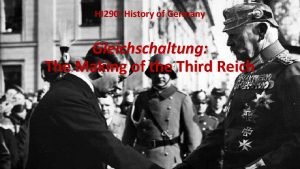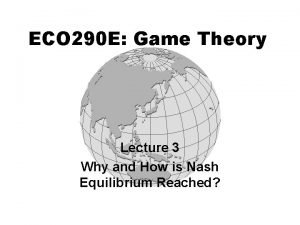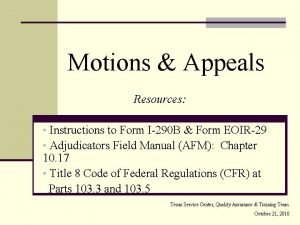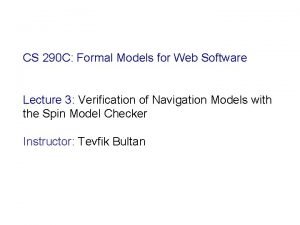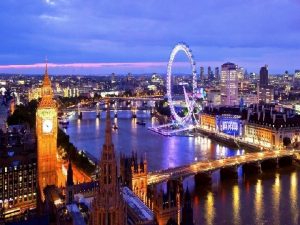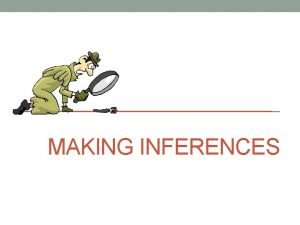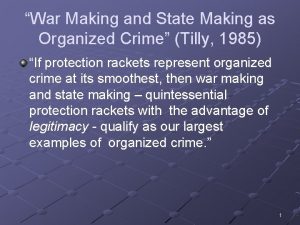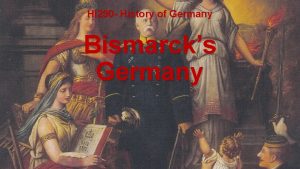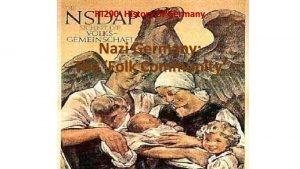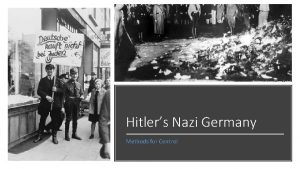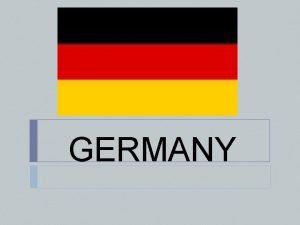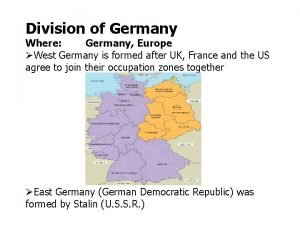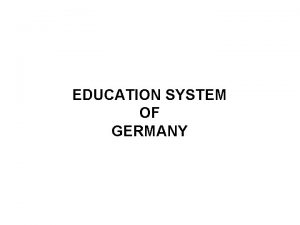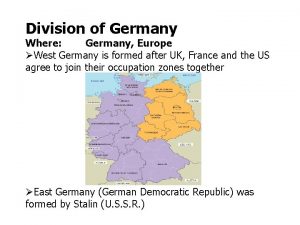HI 290 History of Germany Gleichschaltung The Making














- Slides: 14

HI 290 - History of Germany Gleichschaltung: The Making of the Third Reich

The Campaign for Reichstag Elections, January – March 1933 • New elections called within 24 hours of Hitler becoming Chancellor. • 31 Jan. 1933: Hitler’s ‘Appeal to the German People’ – blamed Germany’s problems on the Communists and presented his government as a ‘National Uprising’ that would restore German pride & unity. • The election campaign took place in an atmosphere of violence and intimidation: SPD and KPD meetings broken up, voters intimidated etc. 69 people killed during the 5 week campaign. • As Minister of the Interior of Prussia Göring recruited 500, 000 extra police in Germany’s largest state, most of them drawn from the ranks of the SA and the SS.

The Reichstag Fire • 27 Feb. 1933: The Reichstag burned down. • An unemployed Dutch bricklayer named Marius van der Lubbe arrested. • The Nazis claimed this was part of a Communist plot. • ‘Decree for the Protection of the People and the State’: suspended civil liberties & increased the power of central government – the Nazis rounded up political opponents. • Van der Lubbe & Bulgarian Communist Georgi Dimitrov put on trial for the fire. • But on-going debate about who was responsible: eg. Richard Evans’ review of Benjamin Hett’s Burning the Reichstag in the London Review of Books (http: //www. lrb. co. uk/v 36/n 09/richard-jevans/the-conspiracists)

Reichstag Elections, 5 March 1933 Percentage of Popular Vote 0. 85 1. 62 2. 73 1. 1 7. 97 11. 25 43. 91 12. 32 Party 18. 25 NSDAP SPD KPD Centre DNVP BVP DVP State Party Other Number of Seats NSDAP 288 SPD 120 KPD 81 Centre 73 DNVP 52 BVP 19 DVP 2 State Party 5 Other 7

Reichstag Elections, 5 March 1933 The Nazis won 33 out of 35 parliamentary constituencies, but only won outright majorities in 8: East Prussia (1), Frankfurt (Oder) (5), Pomerania (6), Breslau (7), Liegnitz (8), Schleswig-Holstein (13), East Hanover (15), Chemnitz. Zwickau (30).

The ‘Day of Potsdam’, 21 March 1933 Hitler aligning himself with the forces of Conservatism: shaking hands with President Hindenburg (left) and being introduced to Crown Prince Wilhelm of Prussia (right).

The Enabling Law (Ermächtigungsgesetz) • Without the two-thirds majority in the Reichstag necessary to change the Constitution, Hitler proposed an ‘Enabling Law’ that would allow him the government to pass legislation without the approval of either parliament or the President. • 23 March 1933: ‘Law for the Removal of Distress from People and the Reich’: • • Article 1: In addition to the procedure prescribed by the constitution [i. e. decision by parliament], laws of the Reich may also be enacted by the government of the Reich. This includes laws as referred to by Articles 85 sentence 2 and Article 87 of the constitution. Article 2: Laws enacted by the government of the Reich may deviate from the constitution as long as they do not affect the institutions of the Reichstag and the Reichsrat. The rights of the President remain undisturbed.

Gleichschaltung (Co-ordination) • April 1933: Laws passed enabling Nazidominated State governments to pass legislation without the approval of provincial parliaments. • 2 May 1933: Leading Trade Unionists arrested & workers’ organizations merged to form the Deutscher Arbeitsfront (German Labour Front, DAF). • 22 June 1933: The SPD officially banned. • June-July 1933: Other political parties dissolved themselves. • 14 July 1933: The Nazi Party proclaimed the only legal political party in Germany. • Jan. 1934: State parliaments abolished & local government subordinated to the federal Minister of the Interior. Nazi propaganda poster demonstrating how political centralisation had transformed a divided Germany into one people in a united nation.

The Night of the Long Knives, 30 June 1934 • Pressure from the party rank-and-file (and particularly from within the SA) for a ‘second revolution’. • Fears that the radicalism of the SA would bring about a military coup against the Nazis. • This led to a purge of the party on 30 June 1934 – the SS carried out raids against targets across Germany. Critics of the regime such as Vice. Chancellor Papen were arrested, while old enemies such as Gregor Strasser & Gustav Ritter von Kahr were summarily executed. Over 1000 people were arrested & at least 85 killed. Ernst Röhm (1887 -1934)

Military Oath of Allegiance Civil Service Oath “I swear by God this sacred oath: I will render unconditional obedience to Adolf Hitler, the Führer of the German nation and people, Supreme Commander of the armed forces, and will be ready as a true soldier to risk my life at any time for this oath”. “I swear: I will be faithful and obedient to the leader of the German empire and people, Adolf Hitler, to observe the law, and to conscientiously fulfil my official duties, so help me God!”

Party and State • In theory Germany was a one party state and that party had a monopoly on power. • Dec. 1933: ‘Law to ensure the Unity of the Party and the State’ declared that the party and state were inseparably linked, but exact relationship still vague. • In practice parallel organizations and institutions. • Attempts to extend control over the organs of the State from the mid-1930 s onwards: • In 1935 Deputy Fuhrer Rudolf Hess given special powers to vet the appointment and promotion of civil servants. • From 1939 all civil servants had to be Party members. • Department of Internal Party Affairs. • Department for Affairs of State. Soucre: R. Overy, The Penguin Historical Atlas of the Third Reich (1996)

The Role of Hitler • He was both Head of State and Head of Government, as well as Commander-in-Chief of the armed forces, head of the civil service & party leader. • In theory he had unlimited power. • But the demands of running a country as large as Germany and Hitler’s personality and lifestyle meant his actual influence was more limited. • One of the central debates surrounds Hitler’s role: Intentionalists see Hitler and his aims as central to the study of the Third Reich; Structuralists put emphasis on a structural analysis of the Third Reich and argue that Hitler was often the prisoner of forces which he may have unleashed but could not totally control.

Plebiscitary Dictatorship: The Façade of Legality Election poster, Nov. 1933: “One people, one leader, one yes!” Ballot paper for the 1938 referendum: "Do you approve of the reunification of Austria with the German reich accomplished on 13 March 1938 and do you vote for the list of our Führer, Adolf Hitler? “ Note the relative sizes of the ‘yes’ and ‘no’ circles.

Legal and Political Interpretations • Ernst Fraenkel’s Dual State (1941) • Franz Neumann’s Behemoth (1942) • Nazi Germany as a state of exception • Siege mentality • Decision taking not according to norms but measures – no more normative law • Personal loyalty crushed by terror • No legality, only technical laws
